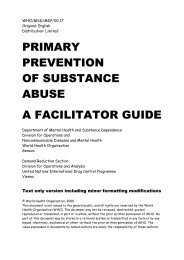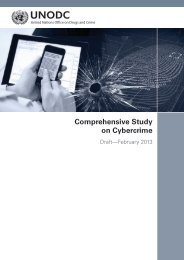Manual for Training Police on Anti Human Trafficking
Manual for Training Police on Anti Human Trafficking
Manual for Training Police on Anti Human Trafficking
You also want an ePaper? Increase the reach of your titles
YUMPU automatically turns print PDFs into web optimized ePapers that Google loves.
<str<strong>on</strong>g>Manual</str<strong>on</strong>g> <str<strong>on</strong>g>for</str<strong>on</strong>g> <str<strong>on</strong>g>Training</str<strong>on</strong>g> <str<strong>on</strong>g>Police</str<strong>on</strong>g> <strong>on</strong> <strong>Anti</strong> <strong>Human</strong> <strong>Trafficking</strong> 54<br />
- A checklist 37 has been provided that suggests ways to ensure this kind of care is heeded.<br />
- As duty bearers, police pers<strong>on</strong>nel are the upholders of the rights of the survivors. The following<br />
key rights should <str<strong>on</strong>g>for</str<strong>on</strong>g>m the basis of the participants’ first resp<strong>on</strong>se to the survivor of trafficking 38 :<br />
1. The right to be treated with dignity.<br />
2. The right to feel safe and not to be harmed.<br />
3. The right to have in<str<strong>on</strong>g>for</str<strong>on</strong>g>mati<strong>on</strong> regarding what is going to happen next.<br />
4. The right to have access to resources like food, clothes, shelter.<br />
5. The right not to be retraumatized.<br />
6. The right not to be criminalized.<br />
As a first step to sensitive behaviour, start by underscoring the importance of effective communicati<strong>on</strong><br />
with the survivor. This would also flow out of your role play exercise.<br />
2. EFFECTIVE COMMUNICATION<br />
<str<strong>on</strong>g>Police</str<strong>on</strong>g> communicati<strong>on</strong>, given the nature of their interface, is very crucial and carries great weight in<br />
significance to the survivor/and survivor/witness – whether the police pers<strong>on</strong>nel is communicating in<br />
a ‘positive’ manner or in a ‘negative’ manner.<br />
It is a vital tool in breaking the ice with the survivor and ensuring that the survivor cooperates in the<br />
process of investigati<strong>on</strong>. In this c<strong>on</strong>text, some key principles/aspects need to be kept in mind:<br />
a) Communicating with c<strong>on</strong>siderati<strong>on</strong> and empathy<br />
<str<strong>on</strong>g>Police</str<strong>on</strong>g> c<strong>on</strong>duct (both procedurally and attitudinally) should be guided by the basic principle that the<br />
trafficked pers<strong>on</strong> is a ‘survivor’ and not an offender. The trafficked pers<strong>on</strong> seeks your support in delivery<br />
of justice and basic rights.<br />
Unlike in the case of role play depicting insensitive victim-police interface the police pers<strong>on</strong> should<br />
always be empathetic to the needs of the survivor and treating them with respect. Validati<strong>on</strong> of the<br />
survivor’s fear and anger is of utmost importance.<br />
More so, effective communicati<strong>on</strong> is a two-way process. Expecting the survivor to be cooperative in<br />
the investigati<strong>on</strong> procedures while not offering them due courtesy and c<strong>on</strong>siderati<strong>on</strong> will <strong>on</strong>ly prove to<br />
be counter-productive. Extra attentiveness to the rights of the victims of crime must be sensitively<br />
sustained in the first resp<strong>on</strong>se and throughout the rescue and support process. 39<br />
Also stress that communicati<strong>on</strong> entails not merely speaking but also effective listening too. Instead of<br />
just telling your participants the dos and d<strong>on</strong>’ts of their communicati<strong>on</strong> with the survivors, you may<br />
want to do the following simple, but very effective exercise with your participants to stress <strong>on</strong> the<br />
importance of effective listening.<br />
EXERCISE<br />
Effective Listening<br />
Estimated time : 20 mins<br />
Material required : No materials required<br />
Methodology : Interactive exercise with pairs<br />
Expected outcome : 1) At the end of the game, participants learn to listen far better than they<br />
normally do. 2) They learn how to set aside their pers<strong>on</strong>al agenda, to fully<br />
listen to <strong>on</strong>e another, avoiding judgment or the giving of advice. They learn<br />
how to grasp subtle elements of interacti<strong>on</strong>, detecting both verbal and n<strong>on</strong>verbal<br />
<str<strong>on</strong>g>for</str<strong>on</strong>g>ms of expressi<strong>on</strong>, taking in moti<strong>on</strong>s or implied c<strong>on</strong>notati<strong>on</strong>s

















